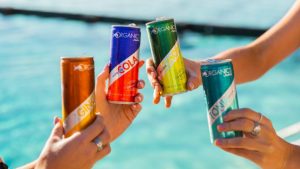Red Bull gives us a glimpse into the Future of Human First Marketing – The New Daily
 Why Red Bull is first and foremost a marketing giant before it is a drinks company – The New Daily
Why Red Bull is first and foremost a marketing giant before it is a drinks company – The New Daily
Red Bull, the manufacturer of the world’s pre-eminent energy drink, is more of a marketing phenomenon than a beverage outfit, despite the fact that it cranks out six billion cans of its product a year.
In just 30 years it has managed to cement itself in the world’s psyche, to the point that it’s known by millions who have not even necessarily tried its products.
“It’s building a brand, but the brand may not be the drink,” said marketing expert from Curtin University, Dr Russell Kingshott.
It has built itself up to be Australia’s energy drink market leader, despite its products being linked to long-term health problems such as an increased diabetes risk, tooth decay and kidney damage.
Most recently, Red Bull, which launched in Australia in 1999, has released a range of ‘organic‘ carbonated drinks.
Although it’s a name known globally, it’s a private company founded by Austrian entrepreneur Dietrich Mateschitz in the mid-1980s, and its financial details are largely kept secret.
IBISWorld analyst Bao Vuong says it’s the country’s biggest energy drink seller, with sales of an estimated $220 million in Australia. Globally, it devotes more than 30 per cent of revenues to marketing, reportedly spending $63 million in Australia last year.
Futurist Morris Miselowski says it uses that spend to create an image for itself, which he likened to what Richard Branson has done.
The secret to Red Bull’s success is the fact that it’s a marketing machine.
“He does all his public stunts in a way that have nothing to do with selling air tickets,” he said.
But Red Bull’s marketing is built on human beings, not products.
Its slick website is full of videos devoted to extreme sports, such as dirt-bike riding and cliff diving.
It has its own Formula One team, Red Bull Racing, as well as a range of sports teams and badged events involving racing things and climbing things across the globe.
Red Bull also heavily invests in music and culture — and high-profile sponsorship. There’s the Red Bull Music Academy, which has hosted events like Red Bull Music Culture Clash and gaming events including the PAX festival.
Dutch racing car driver Max Verstappen signed a three-year sponsorship deal with Red Bull at the end of 2017, which saw him surge to the third-highest-earning driver on the Formula One circuit, only behind multiple world champions.
Dr Michael Callaghan, a marketing and corporate ethics expert, said Red Bull’s marketing spend is one of the largest among soft drinks companies.
Red Bull is effectively a marketing company before it’s a drinks company.
“If Red Bull didn’t continue investing so much money into marketing and advertising, its sales would dry up, because the product would not be top-of-mind and consumers would revert to routine purchases, such as Coca-Cola.
“The cost of what goes into the can is a fraction of what consumers pay. It consists largely of water, carbon dioxide, sugar and flavourings.
“The profit margins on sugary drinks are massive.”
Are the ‘organic’ Red Bull drinks healthy?
As consumers have grown more aware of health concerns and high sugar content relating to processed foods and drinks, soft drink companies have increasingly looked towards health drinks.
Coca-Cola, for example, last month announced its acquisition of a well known Australian kombucha brand. It has also invested in bottled water and nutrient water.
While energy drinks are marketed as boosting energy, and improving concentration and performance, research has shown that for a quick energy fix, consumers could be risking their health in the long term.
Red Bull told The New Daily the new organic range was not an energy drink and would serve as an alternative to soft drink.
Nutrition scientist Dr Tim Crowe said that adding a few plant extracts to a soft drink did not make it a health tonic.
They are just glorified soft drinks.”
Leading nutritionist and dietitian Dr Rosemary Stanton agreed, claiming that the amount of sugar was comparable with any other soft drink.
“Sugars in fruit come with dietary fibre [which slows their release into the bloodstream] and also with vitamins, minerals and a range of phytonutrients,” she said.
“Sugars in Red Bull come with nothing of nutritional value.
“The products are not cheap. Better to spend the money on fruit and vegetables and get regular water from the tap.”